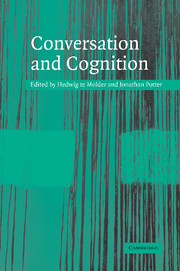Book contents
- Frontmatter
- Contents
- List of contributors
- Acknowledgements
- Transcription conventions
- 1 Talking cognition: mapping and making the terrain
- Part I The interface between cognition and action
- 2 Validating ‘observations’ in discourse studies: a methodological reason for attention to cognition
- 3 Language without mind
- 4 Using participants' video-stimulated comments to complement analyses of interactional practices
- 5 From paradigm to prototype and back again: interactive aspects of ‘cognitive processing’ in standardized survey interviews
- 6 A cognitive agnostic in conversation analysis: when do strategies affect spoken interaction?
- Part II Cognition in action
- References
- Index
6 - A cognitive agnostic in conversation analysis: when do strategies affect spoken interaction?
Published online by Cambridge University Press: 22 September 2009
- Frontmatter
- Contents
- List of contributors
- Acknowledgements
- Transcription conventions
- 1 Talking cognition: mapping and making the terrain
- Part I The interface between cognition and action
- 2 Validating ‘observations’ in discourse studies: a methodological reason for attention to cognition
- 3 Language without mind
- 4 Using participants' video-stimulated comments to complement analyses of interactional practices
- 5 From paradigm to prototype and back again: interactive aspects of ‘cognitive processing’ in standardized survey interviews
- 6 A cognitive agnostic in conversation analysis: when do strategies affect spoken interaction?
- Part II Cognition in action
- References
- Index
Summary
Introduction
In a cartoon I find hilarious there is an egg with hands and feet reaching to take a ticket from one of those number-dispensing machines that you see in bakeries or post offices. The other side of the cartoon shows a hen in the same posture. This cartoon suggests that we might finally be provided with empirical data to address the classic problem in mundane philosophy: which came first, the chicken or the egg?
This chicken-egg question is an English proverb referring to a variety of difficult-to-resolve disputes. For example, since my graduate education I have considered language and thought puzzles to be chicken-egg questions. But this analogy understates the empirical problems we face when we study the mutual interpenetration of talk and cognition. Let us consider what this chicken-egg cartoon, and its attendant proverb, teaches us.
The cartoon suggests that an action which ‘comes first’ enjoys explanatory priority. The social actor who obtains the first number at the post office thereby documents a place in a temporal queue ahead of any other claimant. Or in talk, if one event-type precedes another (e.g. first and second greetings) we sometimes characterize that which came second as consequential from that which came first. Does thought come before talk in this way? How could we test this notion in empirical discourse analysis?
- Type
- Chapter
- Information
- Conversation and Cognition , pp. 134 - 158Publisher: Cambridge University PressPrint publication year: 2005
- 19
- Cited by



